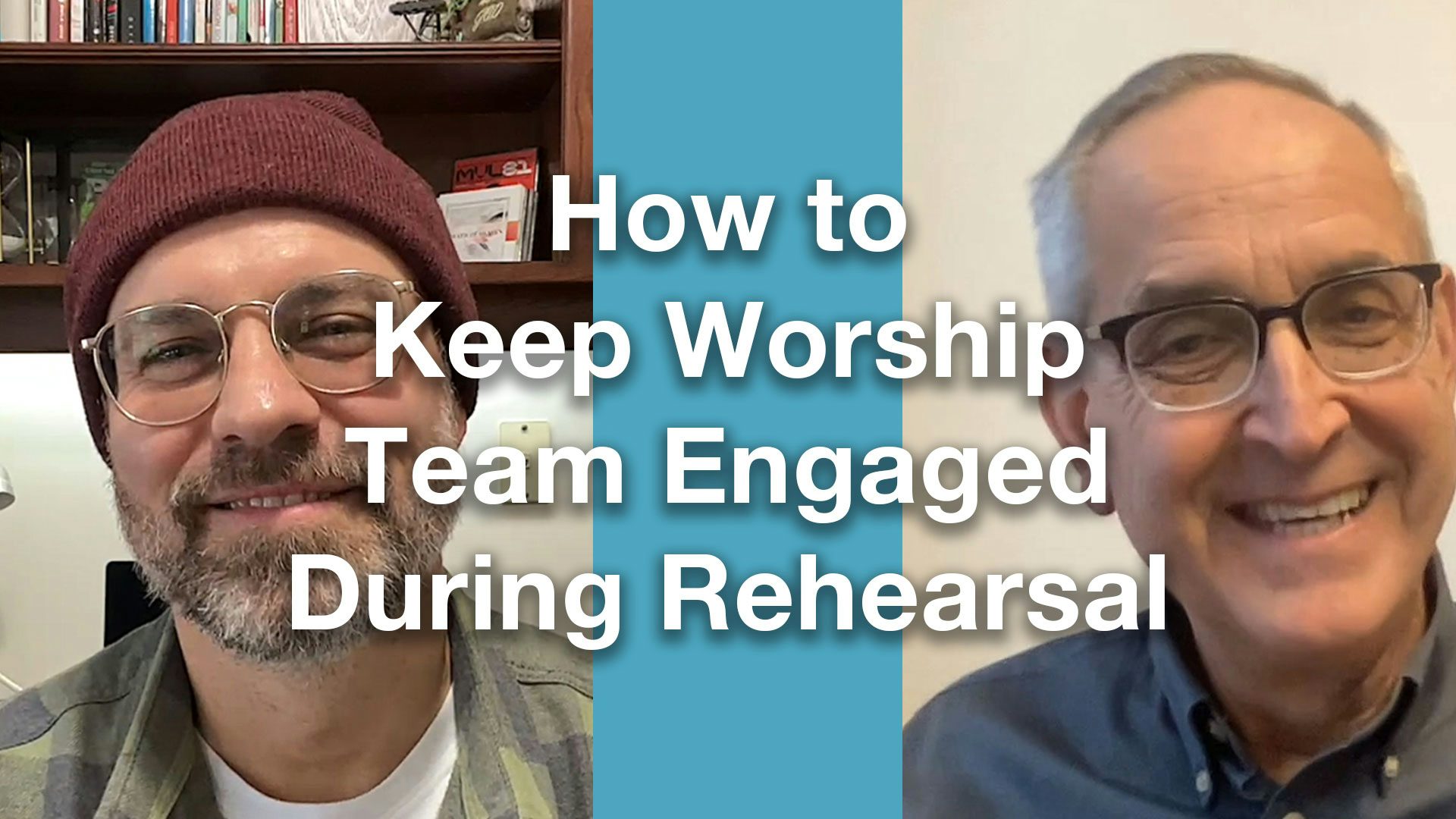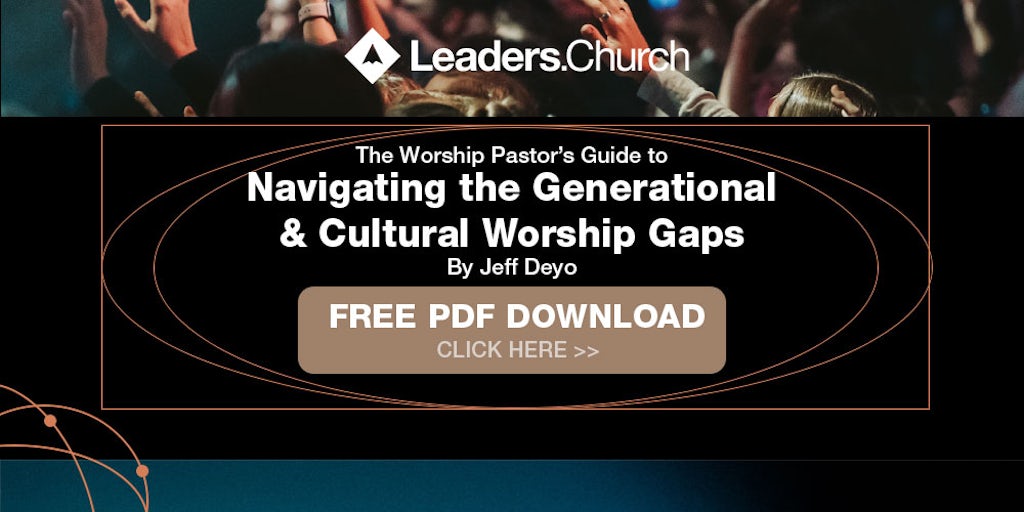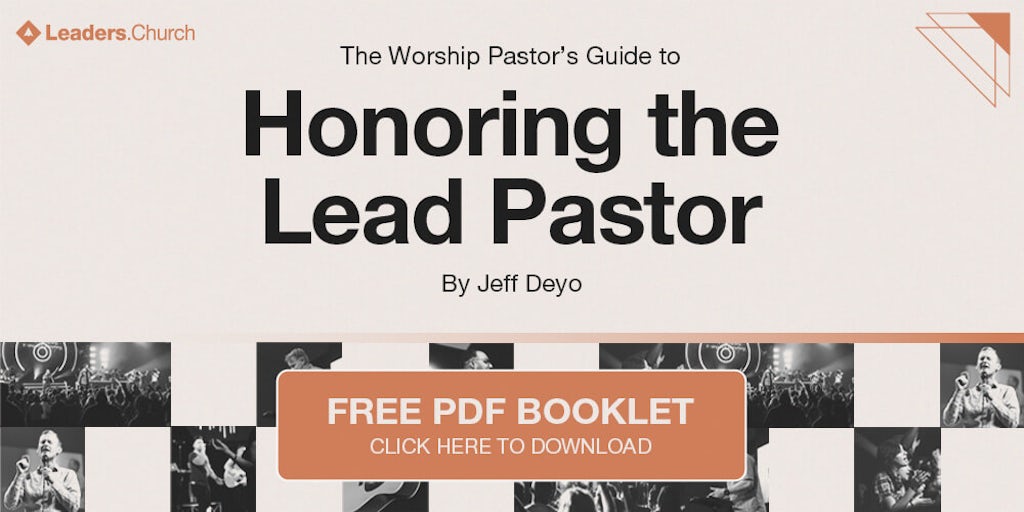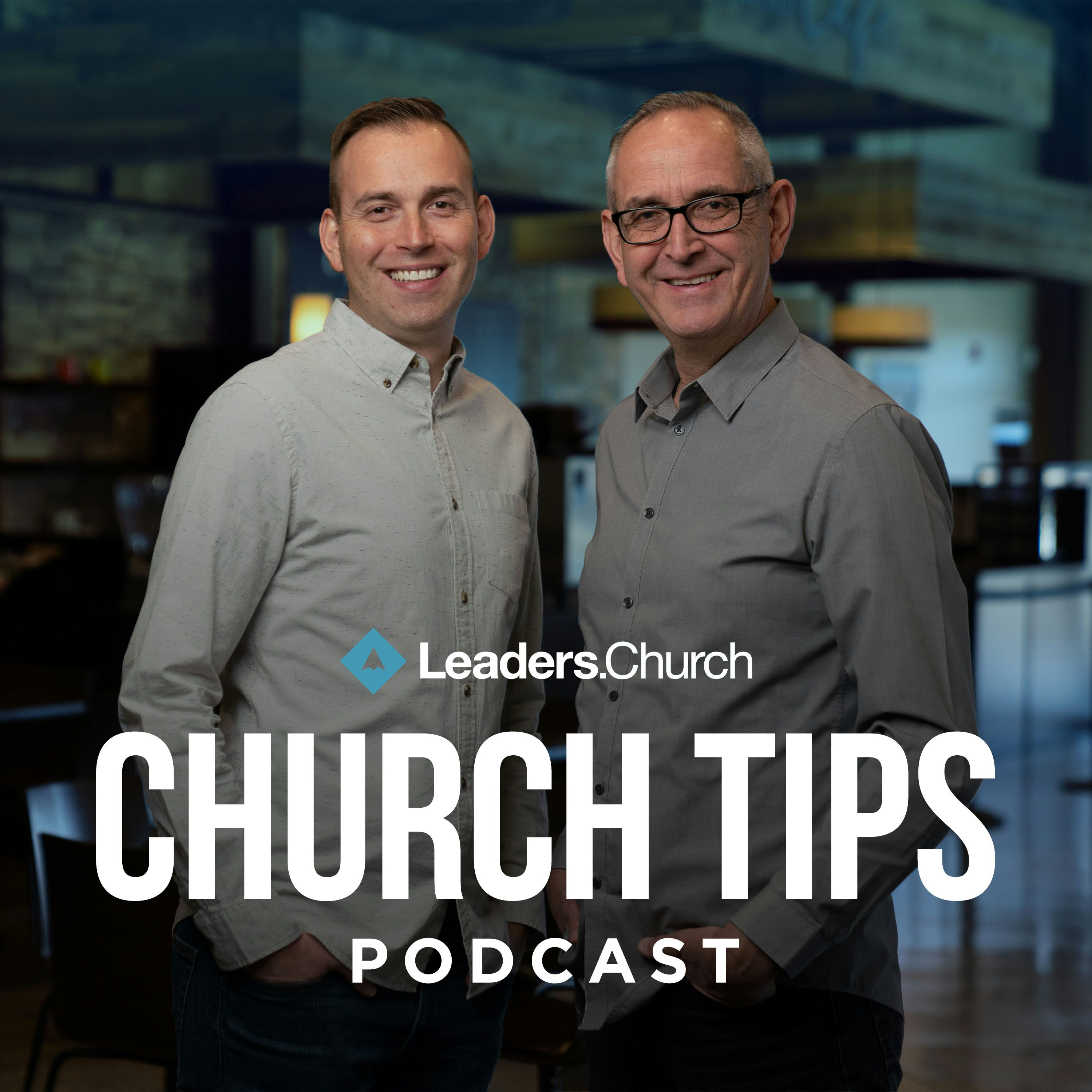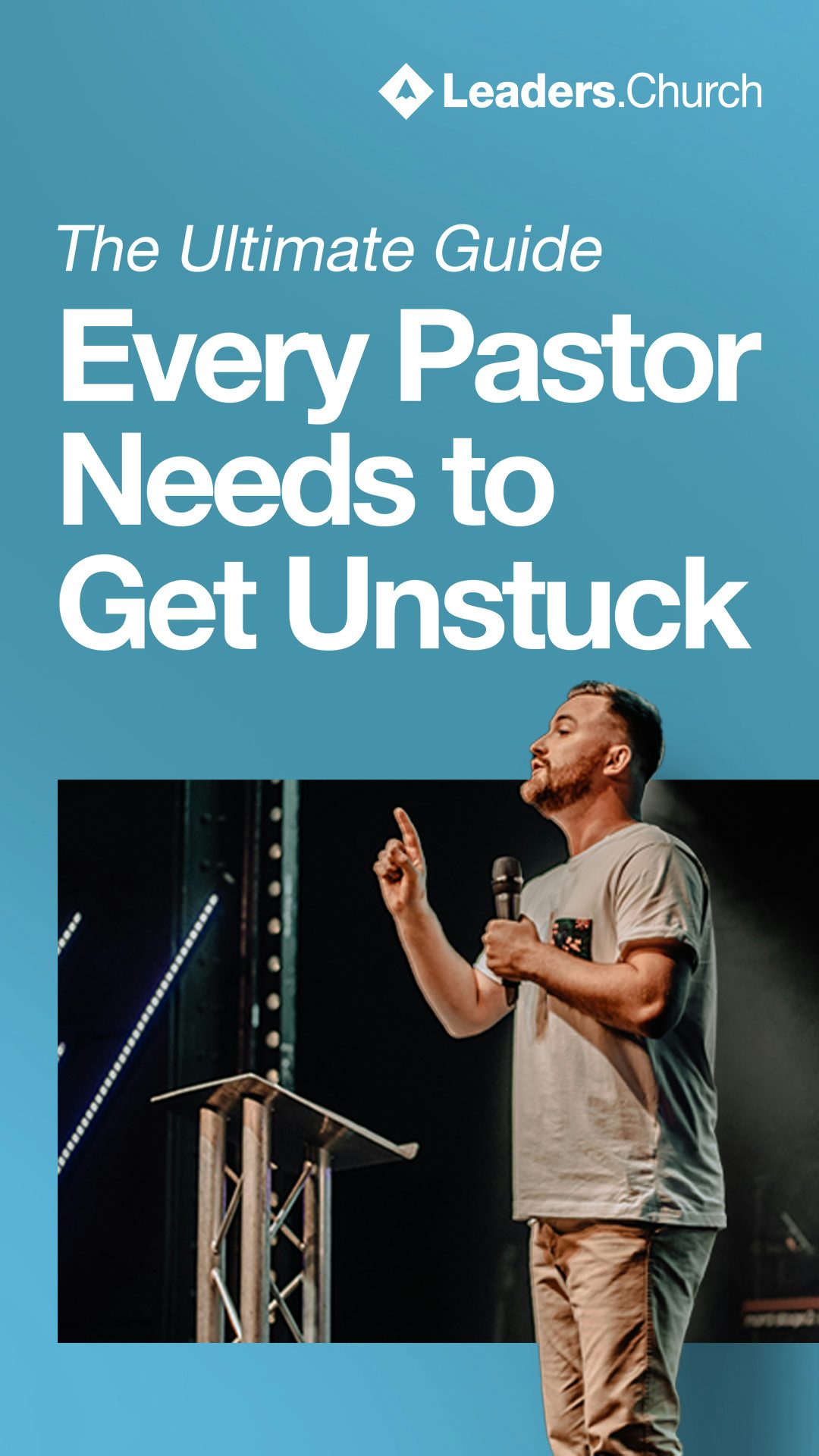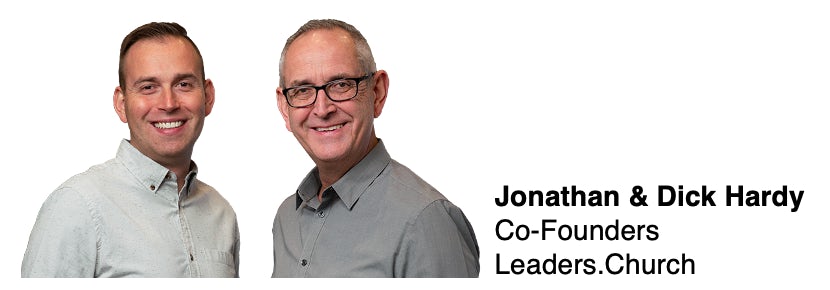How To Keep Worship Teams Engaged During Rehearsal
What’s in this Episode?
In this episode of the Church Tips podcast, Dick Hardy and Jeff Deyo (former lead singer of Sonicflood) talk about how to maintain focus during worship practice.
Show Notes:
PDF’s:
The Pastors Guide to Navigating Generational and Cultural Worship Gaps
The Worship Pastors Guide to Honoring The Lead Pastor
—– Want more free content? —–
Check out this FREE Masterclass on the 4 secrets pastors can use to grow the church: https://leaders.church/4-secrets-masterclass-opportunity/
Subscribe & Follow:
- Subscribe on Apple Podcasts
- Follow on Spotify
- Subscribe to YouTube Channel
- Subscribe on Google Podcasts
- Like us on Facebook
- Follow us on Instagram
- Follow us on Twitter
Other Resources:
- Leaders.Church
- Leaders.Church Blog
- Church University
- Take the Free 5 Day Leadership Challenge for Pastors
- Get Free Access to the 4 Secrets Masterclass
Read the Transcript
Dick Hardy 0:05
Hey friend, it’s great to be with you here on this next episode of the Church Tips Podcast, and I’m with my good friend from Minneapolis, Minnesota, Jeff Deyo. He is a professor at North Central University, and formerly the lead singer for Sonicflood, the great band back in the day. And so it’s great to hang out with you, Jeff, thanks for being with us.
Jeff Deyo 0:28
My pleasure. Love being with you.
Dick Hardy 0:31
You know, we’ve really had a lot of fun over these last number of months, creating the Worship Leadership Course in Church University. In fact, the viewers and listeners, if stay tuned, here, over these next number of days, you’re going to hear more and more about the Worship Leadership Course. And I’m telling you, if you’re a lead pastor, you’re a worship leader, you’re on the team, you are going to want to tap into this. I’ve watched the entirety of the recordings. And I think we got a total of 57 videos, 51 videos and then six bonus videos. So it’s just great content, the Lord really used you, so thank you very much.
Jeff Deyo 1:07
Yeah, it’s a blessing.
Dick Hardy 1:09
Today, we’re, today we’re going to talk about keeping worship team members engaged during rehearsal. So, you know, I bet some non-worship team folks, who just go to church, they think that group just gets up there on Sunday, and they just do their stick. But if you’re the leader, you’re the pastor, and you’re trying to keep these people engaged. Talk to us about that. What kinds of things should people think about?
Jeff Deyo 1:38
Yeah, there’s a whole bunch of things. I’ll touch on a few here. Number one, I think getting everyone settled at the beginning is really important. Like, for example, just having…
Dick Hardy 1:38
At the beginning of rehearsal?
Jeff Deyo 1:41
Yeah, at the beginning of rehearsal, just getting everyone settled So everybody’s bringing their gear in and setting up and we’re doing a soundcheck, and we’re, you know, hitting our instruments, and, you know, doing all this stuff, and, and there’s a lot of chaos and all that. So just kinda have, once all that is done to be able to go, Okay, guys, let’s just come here to the center. And usually, I even will ask team members to put their instruments down and come to the center of the stage, we’ll like have a little circle up, you know, just to help everybody get their hands off their instruments, they’re away from their microphones, you know, they’re not talking to each other. But we’re in a circle, we circle up.
Jeff Deyo 1:41
And then lot of times, I would encourage people to have a devotional of some sort, maybe you actually do a rotation where you have a team member bring just a short scripture, and something that God’s been doing in their life. And then we have a prayer together, and just kind of setting things, setting the stage for the rehearsal. It’s really gonna do you a disservice for you to just kind of jump in just random, like, hey, let’s start playing a song on the kind of meander into the rehearsal, right? You want to have like a genuine beginning, where we give God glory for what we’re doing, come together as a team, and set the state.
Dick Hardy 3:02
Yeah, though, that is so good. That’s so good. You know, I’m picturing. You know, people on the team, sometimes could maybe even be distracting to each other. How do you deal with that?
Jeff Deyo 3:17
And this does happen, I think one of the biggest things that happen, and this has to do with the worship leader developing a culture. One of the biggest things that happen is that musicians will continue to play when they’re not supposed to be playing. The guitarist is just like, we’ve stopped, we’re trying to have this conversation over here about this part. And you know, or they just kind of, you know, they turn their volume way down, I’ve seen the keyboard. And you’re, you’re telling them your heart for God, and you’re telling them about what the pastor is going to be preaching on and stuff. And this guy’s just kind of playing, you’re like, okay.
Jeff Deyo 3:52
You have to establish a culture or say, guys, when we’re not practicing together, we’re not rehearsing together, then I need you to not be playing. And you know, like, we have cues, I’ll do this, this fist cue, is this a stop cue? And so like more playing, I’ll just do this fist. And that tells everybody, oh, we’re stopping? Well, will they keep going for like, you know, 15 seconds? Or will they stop right away, and I just have to establish that culture. And of course, there are other ways that people just…
Dick Hardy 4:21
Now the fist doesn’t mean you could get hurt, if you don’t stop?
Jeff Deyo 4:25
No, this is kind of the known signal around all musicians, bands. Just stop, you know, stop, everybody stop. So everybody knows that signal. A lot of times actually do it down by my side, just so it’s not distracting, if I’m doing that during the worship service even. It just kind of gives the people or the team a place where they know that they’re supposed to come to an end. But you have to establish that culture that people will actually stop when you ask them to stop. Right.
Jeff Deyo 4:56
But there’s of course, other ways they can be distracting and that might be that they’re talking. So, you know, again, if it’s something that is minimal, then you may be… What I do, you know, when people are talking, this could be in a public setting when you’re on a microphone, or it could be in a small group. If I’m talking and there’s other people talking, I usually just pause, because that little silence in my voice brings attention to the fact that other people are talking and they go, oh, oh. You know? So that’s my first, you know, just kind of like, okay, just pause, let that space be there.
Jeff Deyo 5:30
And then if they don’t, you say, hey, guys, can you can you calm down for just a second or whatever, you know? And of course, if it gets bad over and over again, we talked about this in one of our other podcasts, but but you might have to have that conversation with them.
Dick Hardy 5:41
No, no, no, that’s good. Okay, so you’re at the rehearsal, and you can consider that work. We’re doing that. At the same time, you want to have fun, you want them to enjoy it? So how do you get that balance of fun and work to accomplish what you got to do?
Jeff Deyo 6:00
Yeah. There’s gonna be moments where somebody says something funny, and you allow that, you know? Like, you can’t just be all business, right? You can’t just be like, hey, we’ve got to get this done, hey, calm down, quiet. You know, you don’t want to be that the leader that is just in people’s face all the time. You gotta watch the balance with that, right? Sometimes we gotta go, hey, we’re trying to respect everybody’s time. Let’s keep the train moving. But there are moments that will build memories for a lifetime with your team, but somebody’s gonna say something funny, they’re gonna play something funny. And we can lean into that a little bit and encourage that right? Now, there are other ways to have fun as hey, you might decide you want to bring like food and stuff like that to your your rehearsal, you know. But I’ll give you a really important way that I think that we could bring more enjoyment and engagement to our rehearsals, and that is to rehearse some things that really matter. And part of this is knowing what matters.
Jeff Deyo 6:55
Sometimes when bands are rehearsing, they just kind of run the song, run through it again, and is that good? All right, we’re done. But there’s so much more to a rehearsal than just running through the songs, and a couple of those items that I’ll just throw out there. One would be creativity. Like, this is why we tell people to to practice the song at home. So we can rehearse the song there in the rehearsal for the worship team is because it allows us space. If everyone comes knowing the song that allows us space to be creative. Now some people think that, you know, the Elevation police is going to show up if we change the way that Elevation has always done their song. But creativity is part of what God has called us to as a worship team.
Jeff Deyo 7:40
So it’s exciting for a band to realize that we don’t have to regurgitate the song the same way every time, it gets boring and gets blah not only for the band, but also for the congregation. So we have time now set aside in our rehearsal to be creative. Hey, let’s do a key change there. Hey, let’s add an extra bar there. Hey, let’s start with the bridge instead of the verse. Hey, let’s start with a big intro instead of a down intro, all those types of things, you can get creative. And that brings joy to the rehearsal.
Dick Hardy 8:18
Yeah, no, that’s good. Now, the analytical math kind of guy that I am would ask, how long is typically a rehearsal?
Jeff Deyo 8:27
That’s good. I mean, varies, I would say. And there’s two things you have to consider. One is, are you having two rehearsals in a week, and a lot of times people will have like a Thursday night rehearsal, and then they’ll kind of tone it up, tune it up on Sunday morning and have another rehearsal to kind of fine tune everything. But if you only have a Sunday morning rehearsal, well, you’re probably gonna have to have a longer rehearsal than you would if you’d had a Thursday night rehearsal as well.
Jeff Deyo 8:54
I personally, would suggest that nothing under an hour and a half. I would think that hour and a half would be the minimum. But I would honestly suggest that two hours would be good. Again, it depends on if you’re having two rehearsals. If you’re having two, you could probably get away with an hour and a half on a Thursday or the Wednesday, and then maybe an hour on Sunday morning just to fine tune things. It also depends on how long your worship time is, right? If your church does 20 minutes of worship, you’re only talking three or four songs. If your church does 45 minutes of worship, you might be talking about six or seven songs. So it’s going to be longer depending on the number of songs you have.
Dick Hardy 9:32
So if you’ve got an hour and a half rehearsal, how much time is spent talking, hanging out. Because you’re not going 90 minutes nonstop?
Jeff Deyo 9:42
Yeah, exactly.
Dick Hardy 9:44
I don’t know if you think in those terms, but…
Jeff Deyo 9:46
Yeah, absolutely. There’s different components to the rehearsal, right? And I think part of it is is how you decide when the rehearsal starts too, because there’s so many moving parts, as we talked about with soundcheck, and line check, and people setting up gear, and all that. I like to think of the time before the rehearsal as the time when people are kind of, if they want to get there early, they’re hanging out, they’re talking, they’re setting up gear, but they’re also connecting with one another.
Jeff Deyo 10:11
But we always have a hard start time. Say, okay, like everyone needs to be ready by 7pm, you know, for that Thursday night rehearsal. So that means if you have a lot of gear you got to bring, you got to show up at 6:30, right, get your stuff set up, or 6:15. Then maybe the vocalist comes in 5-10 minutes early, and they’re just ready to go because they don’t have any gear to set up. But you kind of have that space set aside for some interaction. I personally wouldn’t have any official time, like, from 7 to 7:10, we’ll just sit and talk. I would set that time aside for some spiritual development at the beginning of the rehearsal, but then get right into the rehearsal, so you can respect people’s time.
Dick Hardy 10:54
Yeah, that’s good. Here’s a practical one for you. You referenced a little bit, but do you provide snacks, goodies, refreshments on a regular basis? Or periodically? What do you do?
Jeff Deyo 11:04
Personally, I would say that it’s not necessary to do that, for the rehearsals for the weekly rehearsals. What I like to do is, I’d leave that for what we call Team Nights, right? And so that’s a different thing than a rehearsal, right? Rehearsals something you’re going to have every week, with your team maybe once or twice a week. Team Nights would be something that would be separate from rehearsals, which we could do a whole nother podcast on Team Nights. But that’s where I think you would want to have maybe a quarterly gathering or maybe every other month gathering, and it’s separate from your rehearsals. It’s on a Friday night, it’s on a Saturday, you know, you might do something fun, or talk about leadership development or music development, those types of things. But in those gatherings, food is a must.
Dick Hardy 11:49
Yeah, gotta have it. Gotta have it. Wow, this has been so good, Jeff, so practical. Give us a hitch up. What do you want the viewer and the listener to take away from his podcast.
Jeff Deyo 11:59
Well, the main thing is making sure you can kind of streamline your rehearsals, and then it doesn’t just become about playing the songs like they are in the recording and just running through it, running through through it, and being done. I want to encourage you to add some creative elements to your rehearsals. Again, I didn’t mention this. But you could add something like spontaneous music. There’s a lot of people that are moving in the direction of really wanting to let the Holy Spirit lead their worship time.
Jeff Deyo 12:25
So they might have two or three or four or five minutes, within the Sunday morning worship, where the Holy Spirit is, is moving and we’re just kind of following Him with our music and allowing people to sing out in the Spirit. Well, those things can actually be rehearsed in your rehearsal. So take 10 minutes, vamp on that bridge, chorus, that bridge progression, and begin to allow people to sing spontaneously, to play spontaneously. And that becomes very exciting, because once again, playing the same thing over and over again gets really boring. And this brings joy and excitement to the rehearsal.
Dick Hardy 13:04
Wow, wow, Jeff, this has been so good. I can’t thank you enough for your input to lead pastors and worship leaders in this way. And to the viewer and the listener, thanks for hanging out with us on this today. We want to mention two PDFs that are available to you. And they are in the show notes. And the first is The Worship Leaders Guide to Navigating Generational and Cultural Gaps. And the second is the Worship Pastors Guide to Honoring the Lead Pastor. And here’s where you would find those. Again, they’re in the show notes, but go to Leaders.Church/Gaps and Leaders.Church/Honor. If you go and you grab both of those, I strongly recommend them, grab them, look at and print them off, provide them for any of your leaders. You’re gonna find these two PDFs to be very helpful. Jeff created those for us and we want to thank him for that.
Dick Hardy 14:03
Also, keep your eye peeled for the Worship Leadership Course that’s coming out in the next number of days. We’re so excited about it. It’s going to be a great addition, every lead pastor and every worship pastor and worship leader are going to want this course to help them take their worship and the Body as a whole to the next level.
Dick Hardy 14:22
Again, Jeff, thanks very much for hanging out with us.
Jeff Deyo 14:27
Love the opportunity. Thanks, Dick.
Dick Hardy 14:27
Make it a great one today and be blessed. See ya.
